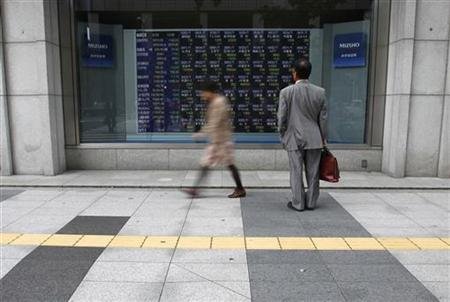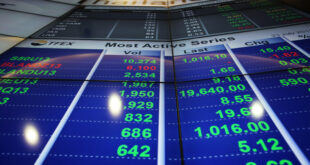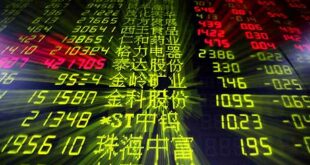Asian stocks rose this week, sending the regional benchmark index to its longest-ever streak of weekly gains, as U.S. economic reports and signs of policy easing in China buoyed the outlook for Asian earnings.
Shui On Land Ltd. (272) led Chinese developers higher on speculation more cities will attempt to lower restrictions on the property market amid signs the economy is gaining strength. Alibaba.com Ltd., China’s biggest e-commerce website, jumped 43 percent after its parent offered to privatize the company. The TSE Second Section Price Index (TSE2) of smaller Tokyo listed companies completed its longest streak of advances since 1961, led by Kagetsuenkanko Co., a hotel and resort manager, which soared 174 percent this week.
The MSCI Asia Pacific Index (MXAP) rose 0.8 percent to 127.97, capping its 10th week of advance, the longest such streak since its inception in 1988. The rally, which has taken the gauge to within 1 percent of entering a so-called bull market, was powered by optimism Europe will contain its sovereign-debt crisis, bets China will ease monetary policy and signs the U.S. economy is improving.
“If you can get better data on employment and housing, I think investors will be comfortable the recovery in the U.S. this time around has a better chance of surviving and thriving,” said Prasad Patkar, who helps manage about $1 billion at Platypus Asset Management Ltd. in Sydney. “Improved risk appetite and improving economic fundamentals will create a catalyst that’s been lacking despite attractive valuations across a number of risk assets.”
Regional Indexes
Japan’s Nikkei 225 Stock Average (NKY) rose 2.8 percent, for a third week of gains. South Korea’s Kospi Index slipped 0.2 percent.
Australia’s S&P/ASX 200 Index gained 2.6 percent, led by OneSteel Ltd., which jumped 38 percent after saying it will refocus its business toward iron ore. Casino operator Echo Entertainment Group Ltd. (EGP), which climbed 19 percent, had the Australian gauge’s third-biggest advance after Crown Ltd. doubled its stake in the company to 10 percent and sought regulatory approval to buy more.
China’s Shanghai Composite Index (SHCOMP) rose 3.5 percent. Chinese developers advanced after the Conference Board’s gauge of leading indicators for the world’s second-largest economy gained 1.6 percent last month after rising 0.8 percent in December. The nation’s central bank on Feb. 18 announced the second cut in bank reserve requirements in three months as policy makers step up efforts to boost liquidity and sustain growth.
Shui On, Agile
Shui On climbed 16 percent to HK$3.45. China Vanke Co. (000002), the country’s largest-listed developer, jumped 9.2 percent in the southern city of Shenzhen. Agile Property Holdings Ltd. (3383) surged 15 percent in Hong Kong. Hong Kong’s Hang Seng Index (HSI) slipped 0.4 percent, snapping a seven-week streak of gains. percent to 8.87 yuan.
Shanghai, China’s biggest commercial city, will implement differentiated taxation and mortgage policies for home buyers and will have increased affordable housing by 1 million units by 2015, according to a five-year housing plan posted on the city government’s website on Feb. 22. The Shanghai government also said this week it will allow some residence permit holders to buy second homes by loosening the definition of locals.
“The rally carried on as property easing signals from local governments loomed,” said Dai Fang, a Shanghai-based analyst at Zheshang Securities.
Oil Surge
Cathay Pacific Airways Ltd., Hong Kong’s biggest carrier slipped 7.7 percent to HK$14.72. Cosco Pacific Ltd. (1199) a port operator which own Greece’s Piraeus Port, dropped 8.1 percent to HK$11.58 as oil prices at a 9-month high tempered optimism from a deal to help the European country avoid default.
Crude oil for April delivery gained 6.3 percent to $109.77 a barrel this week on the New York Mercantile Exchange, touching the highest level since May 3. The rally propelled energy companies higher but dragged transport-related shares lower.
Inpex Corp. (1605) gained 9.4 percent to 603,000 yen in Tokyo, while Woodside Petroleum Ltd. (WPL), Australia’s No. 2 oil producer, climbed 8.4 percent to A$37.86.
Applications for U.S. unemployment insurance benefits were unchanged in the week ended Feb. 18 at 351,000, the fewest since March 2008, Labor Department figures showed Feb. 23. The Bloomberg Consumer Comfort Index rose to minus 38.4 in the week to Feb. 19, the strongest reading since April 2008.
Japan Small Caps
Sony Corp. (6758), Japan’s leading exporter of consumer electronics, increased 7.2 percent to 1,740 yen. Li & Fung Ltd. (494), the biggest supplier to Wal-Mart Stores Inc., climbed 1.2 percent to HK$18. Man Wah Holdings Ltd., the Hong Kong sofa maker that gets 54 percent of sales in the U.S. surged 11 percent to HK$5.70.
Kagetsuenkanko surged 174 percent this week to 115 yen, the biggest increase on Tokyo’s second-section gauge. The stock has risen 311 percent since Jan. 16.
The smaller companies index has climbed 11 percent during the streak. Still, stocks in the measure trade at about 0.7 times the value of their net assets compared with 1.2 times for the Topix Index (TPX) of Tokyo’s biggest companies.
Four stimulus packages totaling 21 trillion yen have fueled demand and lifted shares of companies that rely on the domestic economy, such as regional lender Kirayaka Bank Ltd. and Delica Foods Co. Japan’s retail sales rose in December by the most in 16 months, boosting prospects for second section firms, more than a third of which cater to consumers.
“The biggest factor supporting domestic-focused shares is reconstruction demand,” said Masaru Hamasaki, who helps oversee the equivalent $24 billion as chief strategist at Toyota Asset Management Co. in Tokyo. “Recent gains are mainly driven by an adjustment in valuations as investors recognize how cheap these shares are.”
Source: Bloomberg
 Asia Finance News Asia finance news, banking, market analysis, business, Forex, trade, Cryptocurrency as it is happening in Asia. Trusted gateway for Asian financial news.
Asia Finance News Asia finance news, banking, market analysis, business, Forex, trade, Cryptocurrency as it is happening in Asia. Trusted gateway for Asian financial news.





